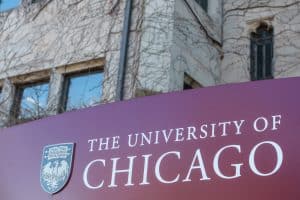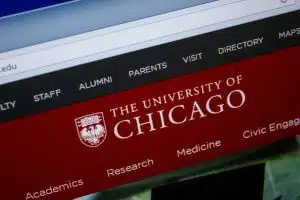UChicago gives you the option to apply through Early Action, which is non-binding. This means you can submit your application early, get your decision by mid-December, and still have until May 1 to make up your mind about enrolling.
If you’re certain UChicago is your top choice, though, they also offer two binding options: Early Decision I and Early Decision II, where you commit to attending if you’re accepted.
While exact figures aren’t available, applying through UChicago’s Early Action can sometimes offer a slight advantage due to demonstrated interest. Keep in mind, though, that UChicago’s overall acceptance rate is highly competitive, around 5% in recent years.
In this blog, we explore UChicago’s application options in detail, including Early Action (EA) and its benefits, as well as the binding Early Decision plans (ED I and ED II) and Regular Decision.
- Early Action at the University of Chicago
- Early Decision and Regular Decision at UChicago
- Complete Early Action Timeline for 2024-2025
- What Are Your Chances of Getting into UChicago through Early Action?
- Why Choose Early Action When Applying to UChicago?
- What Does UChicago Look For?
- Frequently Asked QuestionsF
- Takeaways
Early Action at the University of Chicago
UChicago gives first-year applicants four different application plans from which to choose:
- Early Action
- Early Decision I
- Early Decision II
- Regular Decision
No matter which option you go with, your application will get the same thoughtful review, so it’s all about picking the one that fits you best. It’s a good idea to explore a variety of college options before deciding how and where to apply.
If you’re not ready to commit but want to apply early, there’s a non-binding Early Action plan, as well as the Regular Decision option if you need more time. But if you’re 100% sure UChicago is your top choice and you’re ready to commit, there are two Early Decision rounds that might be a better fit.
Is UChicago’s Early Action for you?
If you’re looking to apply early but aren’t ready to commit to a specific college yet, UChicago’s Early Action (EA) plan could be a great fit for you. The EA deadline lets you submit your application early and get an admissions decision by mid-December, giving you plenty of time to explore all your options.
Unlike Early Decision, Early Action is non-binding, so if you’re admitted, you don’t have to make a final decision until May 1. This flexibility is perfect if you want to compare admissions offers and financial aid packages from multiple schools before choosing where to enroll.
As an Early Action applicant, you’ll receive one of three decisions:
- Admit. Congratulations! You’re in! You’ll have until May 1 to decide if UChicago is the right choice for you.
- Deny. Unfortunately, your application wasn’t successful, and your process with UChicago ends here.
- Defer. Your application will be reviewed again in the Regular Decision round, giving you another chance to be considered.
Early Action is perfect for students who want to hear back sooner but aren’t ready to make a binding commitment. It’s a flexible option that helps you stay on track while keeping your options open.
Early Decision and Regular Decision at UChicago
In addition to Early Action, UChicago gives you a couple of other options: two types of Early Decision plans and Regular Decision. Each plan has its own unique details, so it’s worth understanding how they work to figure out which one fits your situation best. Here’s a quick rundown of what makes each option different!
Early Decision I
If UChicago is your absolute first choice and you’re 100% sure you’d attend if admitted, Early Decision I (ED I) might be the perfect option for you. This plan is binding, which means if you’re accepted, you’re committing to enroll at UChicago, withdraw any other college applications, and not apply to any additional schools. It’s ideal if you’re ready to make UChicago your home without hesitation.
That said, if you’re excited about applying early but still want to weigh your options and compare admissions offers or financial aid packages from other schools, Early Action might be a better fit since it’s non-binding.
A few important things to note about Early Decision:
- You can only apply to one college under an Early Decision plan.
- You’re still allowed to apply to other schools through non-binding options (like Early Action or Regular Decision) alongside your ED application.
As an ED I applicant, you’ll receive one of three decisions:
- Admit. Congrats! You’re in! Time to officially commit to UChicago.
- Deny. Unfortunately, your application won’t move forward.
- Defer. Your application will be reconsidered during the Regular Decision round.
Early Decision II
Early Decision II (ED II) is a great option if UChicago is your clear first choice, but you need a little more time to prepare your application and can’t meet the November 1 Early Decision I deadline.
Like ED I, this plan is binding, which means if you’re admitted, you’re committing to attend UChicago. You’ll also need to withdraw any other college applications and agree not to apply to additional schools.
If you love the idea of applying to UChicago but want to keep your options open and compare offers or financial aid packages, Regular Decision might be a better fit since it’s non-binding.
Here are a few key things to keep in mind about ED II:
- You can only apply to one school under an Early Decision plan.
- However, you can still apply to other colleges using non-binding options, like Early Action or Regular Decision.
ED II is perfect for students who know UChicago is the one but need more time to finalize their application. Just make sure you’re fully committed to attending before you apply!
As an Early Decision II applicant, you’ll get one of three outcomes:
- Admit. You’re in! Since ED II is binding, you’ll need to commit to UChicago and withdraw applications from any other schools. Time to celebrate!
- Deny. Unfortunately, your application wasn’t successful, and you won’t be offered a spot at UChicago.
- Waitlist. You haven’t been admitted yet, but there’s still a chance. UChicago may offer you a spot later if space becomes available.
Regular Decision
The Regular Decision (RD) route is UChicago’s standard non-binding application plan. This means that if you’re admitted, you’re not obligated to commit, and you’ll have until May 1 to decide if UChicago is the right fit for you.
If you think your application will be stronger by January than it would be in November—or if you want to keep your options open and compare offers and financial aid packages from multiple schools—Regular Decision might be the way to go. It gives you the time you need to present the best possible application without the pressure of an early deadline or binding commitment.
As a Regular Decision applicant, you’ll receive one of three outcomes:
- Admit. Congratulations, you’re in! You’ll have time to review your options before deciding.
- Deny. Unfortunately, your application wasn’t successful this time.
- Waitlist. You haven’t been admitted yet, but you’re still in the running if space becomes available later.
Regular Decision is a great option if you want more time to prepare your materials and keep your college choices open!
Complete Early Action Timeline for 2024-2025
Here’s a quick breakdown of UChicago’s 2024-2025 application timelines to help you plan ahead. Whether you’re ready to commit early or need more time to decide, there’s an option that works for you. Check out the important dates for each application plan below:
Early Action
- Application due date: November 1
- Decision release date: Mid-December
- Student reply due date: May 1
Early Decision I (Binding)
- Application due date: November 1
- Decision release date: Mid-December
- Student reply due date: Mid-January
Early Decision II (Binding)
- Application due date: January 6
- Decision release date: Mid-February
- Student reply due date: Early March
Regular Decision
- Application due date: January 6
- Decision release date: Late March
- Student reply due date: May 1
What Are Your Chances of Getting into UChicago through Early Action?
Choosing Early Action (EA) when applying to the University of Chicago can give you a real boost in the admissions process.
While UChicago doesn’t release specific acceptance rates for EA, applying early at highly selective schools like UChicago often improves your chances compared to waiting for Regular Decision. It shows you’re proactive, organized, and genuinely interested—qualities that can make you stand out in a competitive applicant pool.
For most top-tier schools, applying early—whether Early Action or Early Decision—can offer an edge. Though Early Decision typically has the largest boost because of its binding commitment, Early Action still gives you a chance to shine earlier in the process and demonstrates strong interest.
This can be especially helpful at super-selective schools like UChicago, where the overall acceptance rate has been around 5% in recent years.
How does this affect your chances?
- Early advantage. Submitting your application by the November 1 EA deadline allows you to get your decision earlier and potentially stand out in the early applicant pool. While not binding like Early Decision, EA still signals strong interest in UChicago.
- Competitive process. With UChicago’s extremely low overall acceptance rate, even Early Action applicants face tough competition. You’ll need to present a strong application with stellar academics, extracurricular involvement, and a compelling reason why UChicago is a great fit for you.
- Flexibility. Unlike Early Decision, Early Action is non-binding, meaning you’re not required to commit if admitted. You’ll have until May 1 to compare offers and financial aid packages from other schools before making your final decision.
If UChicago is high on your list, applying through Early Action can give you the chance to show your interest early, potentially boosting your chances of acceptance. However, it’s important to keep in mind that the process is still highly selective, and you’ll need to put forward a well-rounded, standout application.
If you need more time to perfect your materials or want to keep your options open, Regular Decision might be a better route. Either way, applying early can demonstrate your enthusiasm for UChicago and help you stay ahead in this competitive admissions process.
Why Choose Early Action When Applying to UChicago?
If you’re considering applying to UChicago, Early Action (EA) can be a great option—especially if you’re excited to apply early but aren’t quite ready to commit. Here’s why Early Action might be the right move for you:
- Get your decision sooner. By applying EA, you’ll submit your application by November 1 and get your admission decision by mid-December. This gives you a head start on knowing where you stand with UChicago before most Regular Decision deadlines roll around.
- Non-binding flexibility. The best part about Early Action? It’s non-binding. You don’t have to commit right away if you’re accepted. You’ll have until May 1 to make your final decision, giving you plenty of time to explore other schools, compare offers, and review financial aid packages.
- Show your interest. Applying early demonstrates genuine enthusiasm for UChicago. While it’s not a binding agreement like Early Decision, EA still shows that you’re serious about attending. Admissions officers appreciate students who are excited about their school.
- Less stress later on. Submitting your application early means one less thing to worry about during your senior year. You’ll have more time to focus on other schools, and scholarships or simply enjoy the rest of high school.
While Early Action has its perks, there are a few things you should think about before applying:
- Strong application. The admissions process at UChicago is extremely competitive, with an overall acceptance rate of around 5%. Submitting your application early means you need to be confident it’s as polished as possible—strong academics, impactful extracurriculars, and an authentic, well-crafted essay.
- No early boost like ED. Unlike Early Decision, Early Action doesn’t offer as much of an acceptance-rate advantage since it’s non-binding. It’s a smart choice if you’re confident in your application but not ready to commit.
- Be ready to wait. Even if you’re deferred in December, your application will be reviewed again during the Regular Decision cycle. While this gives you another shot, it also means you’ll need to be patient for a final answer.
What Does UChicago Look For?
If you’re wondering how to make your application to UChicago stand out, you’re not alone! Here’s what you need to know about crafting a strong, compelling application that highlights your unique story and strengths.
What makes an application stand out?
Your application is all about telling your story. Each part contributes something unique:
- Transcripts. These show your academic strengths and the subjects you’re passionate about. According to UChicago’s latest Common Data Set, admitted students have an average weighted GPA of 4.32. To stay competitive, aim for a GPA close to or above that.
- Standardized tests. If you submit scores, they highlight your abilities in specific areas. If you’re submitting SAT scores, aim for 1560 or higher to strengthen your application. For the ACT, a score of 35 or above can demonstrate that you meet UChicago’s academic standards.
- Essays and recommendations. This is where you get to showcase who you are beyond the numbers. Your personal statements and letters of recommendation help tell the story of your experiences, goals, and what makes you a great fit for UChicago. This includes the Personal Statement, which is part of the Common Application or Coalition Application, and two UChicago-specific essays: the “Why UChicago?” essay and a response to one of their creative and unique prompts. For recommendations, UChicago requires two letters from teachers who can speak to your academic abilities and one from your high school counselor.
If you’re concerned about any part of your application, don’t stress. Attending admissions events can be a great way to get answers to your questions and hear from other applicants with similar concerns.
Are certain test scores or coursework required?
UChicago uses a holistic approach to evaluate applications, meaning they look at everything—your academics, test scores, experiences, and more. They’re not just looking for one type of student; they value diversity in backgrounds and interests.
For example, you might worry you don’t have the “right” classes or scores for a competitive program. But often, students with liberal arts backgrounds bring strong critical thinking and writing skills—qualities that make them stand out.
That said, it’s still a good idea to aim for test scores within or above UChicago’s average range to strengthen your application and show that you’re ready for the academic challenge that awaits. Don’t assume a single missing course or score will hold you back, but boosting other parts of your application can definitely help.
What common mistakes should you avoid?
The biggest mistakes students make? Procrastination! To keep your application strong:
- Start your essays early. Writing a great personal statement takes time, so give yourself room to brainstorm, edit, and polish.
- Ask for recommendations early. Your recommenders are busy, so reach out well in advance. Check in to make sure they submit before the deadline.
- Don’t delay submitting your materials. UChicago won’t review incomplete applications, so double-check that everything is in on time.
What’s the most important thing to focus on?
UChicago is looking for students who are genuinely excited about their programs, community, and opportunities. Show this excitement throughout your application:
- Engage with UChicago. Attend admissions events like webinars or campus visits, and connect with current students or staff if you can.
- Be specific in your essays. Talk about what excites you about UChicago. Mention specific courses, programs, student organizations, or campus resources that align with your goals.
For example, if you’re passionate about real-world impact, highlight opportunities like research projects, collaborative programs, or unique organizations you want to join. The more specific you are, the better you’ll show why UChicago is a perfect fit for you.
UChicago wants to see your passion, curiosity, and commitment to making a difference. Your application is your chance to tell your story—make it clear, authentic, and thoughtful.
Frequently Asked Questions
1. Does UChicago have Early Action?
Yes, UChicago offers a non-binding Early Action (EA) option, allowing you to apply early and receive a decision by mid-December without committing to enroll.
2. How many types of applications does UChicago have?
UChicago offers four types of application plans for first-year applicants:
- Early Action (EA). Non-binding; apply early and receive your decision in mid-December.
- Early Decision I (ED I). Binding; apply by November 1 and commit to attending if admitted.
- Early Decision II (ED II). Binding; apply by January 6 and commit to attending if admitted.
- Regular Decision (RD). Non-binding; apply by January 6 and receive your decision in late March.
3. Does Early Action help with increasing my chances of getting into UChicago?
Applying through Early Action (EA) at UChicago can help your application stand out, but it doesn’t offer the same admissions boost as a binding Early Decision plan. EA is non-binding, meaning it doesn’t require you to commit to attending if accepted, but it does show your enthusiasm and early interest in UChicago.
While UChicago doesn’t publish specific EA acceptance rates, applying early can have indirect benefits. Your application is reviewed in a smaller, earlier pool of applicants, which might work in your favor if you have strong qualifications.
However, UChicago’s admissions process is highly competitive, with an overall acceptance rate of about 5%, so a strong application is critical regardless of your chosen plan.
Takeaways
Getting to know UChicago’s application process can help you figure out the best way to apply, whether you’re ready to commit or just want to keep your options open.
- UChicago’s Early Action (EA) plan is non-binding, allowing you to apply early and get your decision by mid-December. You’ll still have until May 1 to decide if you want to enroll.
- Although UChicago does not disclose specific EA acceptance rates, applying early often demonstrates strong interest and organization, which can give your application a subtle edge.
- UChicago is one of the most selective schools, with an acceptance rate of about 5%. Early Action might help, but your best chance comes from submitting a strong application that shows your academic success, activities, and excitement for UChicago.
- If you’re unsure which UChicago application plan is right for you, consider working with a college admissions expert. They can help you make the most of your resources and guide you toward the best decisions for your goals.






































